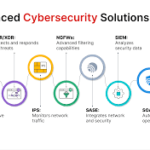Cybersecurity is the practice of protecting systems, networks, and programs from digital attacks. These cyberattacks are usually carried out, for destroying sensitive information, extorting money from users through ransomware.
Cybersecurity threats
The cyber threat is constantly evolving, with attackers employing increasingly sophisticated tactics and technologies. Some of the most common threats include:
- Malware: Malicious software designed to disrupt, damage, or gain unauthorized access to computer systems. Examples include viruses, worms, Trojan horses, and spyware.
- Ransomware: A type of malware that encrypts files or locks a user out of their system, demanding a ransom payment for restoration.
- Phishing: Fraudulent emails or messages that deceive users into revealing sensitive information like login credentials or financial details.
- Social Engineering: Manipulating people into disclosing secrets or performing actions that compromise security, often by exploiting trust and cognitive biases.
- Denial-of-Service (DoS) Attacks: Overwhelming a system with traffic to make it unavailable to legitimate users.
- Advanced Persistent Threats (APTs): Multi-stage attack techniques that allow attackers to remain undetected in a system for extended periods.
- Insider Threats: Malicious or unintentional actions by authorized users (employees, contractors) that compromise security
Selecting a cybersecurity provider
When selecting an advanced cyber services company, be mindful of the following:
Know what you need: Determine what vulnerabilities face your business, what regulations that you are subject to, and what your budget is.
Consider the vendor’s expertise and experience: Choose a company that specializes in cybersecurity, has direct certification, and has a skilled team.
Understand the types of services they provide: Verify they provide services such as threat detection, incident response, vulnerability assessment and penetration testing (VAPT), and managed security services.
Be mindful of their technology and tools: Look for advanced detection solutions that utilize AI and machine learning, integration with existing systems (SIEM, SOAR), and cloud-native security if applicable.
Understand the vendor’s reputation, customer reviews, and customer references: See what other businesses experienced regarding their trustworthiness and effectiveness.
Assess the vendor support and responsiveness: Dedicated support is important at the moment of attack, and time is of the essence.
Cost vs. Value: Finding a balance between affordability and the comprehensive and effective services delivered is important according to Cyber Security Hive.
Consider their local presence and support: Local vendors can have a better understanding of the specific threats facing the geographic location and compliance requirements.
Focus on customization and scalability: Ensure the vendor can modify their services to suit your needs.
Conclusion
We need cybersecurity for our personal and professional privancy and prevent any data leaks or breach.

